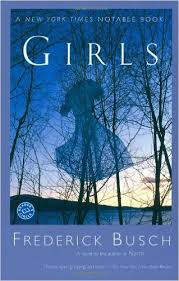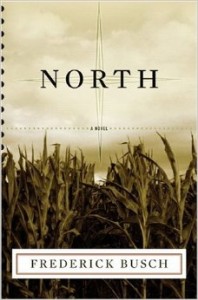A Book Review of Girls, a Novel by Frederick Busch
A Book Review of
Girls, a Novel by Frederick Busch
It has been said that Frederick Busch is a writer’s writer.  He was an award-winning author whose books were loved by critics but ignored by the mass audience required for climbing bestseller lists. And that’s too bad for readers, for they are missing out on beautifully woven, poetically told, compelling stories of the intimate lives and tragedies of ordinary people.
He was an award-winning author whose books were loved by critics but ignored by the mass audience required for climbing bestseller lists. And that’s too bad for readers, for they are missing out on beautifully woven, poetically told, compelling stories of the intimate lives and tragedies of ordinary people.
In Girls, Jack, our narrator/protagonist, is the Chief of Campus Police at a prestigious upstate New York college, his wife Fanny, an emergency room nurse. Mr. Busch quickly dissuades the reader of any bucolic image we may conjure when he writes of the campus, “The buildings were pure state architecture, ugly and gray and sad, with windows that didn’t look like they’d ever been open and doors that slammed on sour-smelling hallways.” Add to that, the cold and snow of a place where winter never seems to end.
 As a campus police officer Jack’s authority is limited to issuing parking tickets, and trying to keep the well-heeled students from injuring themselves. He’s the kind of man we used to call “the strong silent type” but he does talk, though mostly to himself and his ever-present dog, seldom to his wife, or his college professor mistress.
As a campus police officer Jack’s authority is limited to issuing parking tickets, and trying to keep the well-heeled students from injuring themselves. He’s the kind of man we used to call “the strong silent type” but he does talk, though mostly to himself and his ever-present dog, seldom to his wife, or his college professor mistress.
All marriages have secrets and what is eating at Jack’s soul, and blocking communication with his wife, is the death of the couple’s infant daughter. The guilt Jack carries with him leads him to think, “I’d been required to qualify for a license to drive and I’d had to apply for a permit to keep my handgun, but no one had asked me a question about my abilities to be a father to a small girl.” No doubt the same question many of us have asked ourselves.
Upstate New York is having an outbreak of missing young girls. Posters of lost children are everywhere and new ones seem to appear daily. Jack is drafted by well-meaning friends to help find one of the missing girls, Janice Tanner, the fourteen-year-old daughter of a local minister. Janice’s mother is terminally ill, giving an unspoken urgency to finding the girl. Everyone describes Janice as “the teenage perfect girl.” Rosalie, Jack’s mistress professor, informs him there is no such thing. This prods him into looking for a possible dark side to the minister’s daughter.
The “Girls” of the novel’s title go beyond Jack’s inadequacies of dealing with his daughter’s death and the missing Janice Tanner. His wife Fanny struggles for answers to questions she is unable to ask her husband. Janice’s mother, Mrs. Tanner, has more faith in Jack than he has in himself. And there is the mistress, Rosalie Piri, who wants from Jack something that he cannot give.
the missing Janice Tanner. His wife Fanny struggles for answers to questions she is unable to ask her husband. Janice’s mother, Mrs. Tanner, has more faith in Jack than he has in himself. And there is the mistress, Rosalie Piri, who wants from Jack something that he cannot give.
If you enjoy reading Girls, you may want to pursue Mr. Busch’s sequel, North. After running from his demons, Jack returns to Upstate New York to, once again, search for a missing child.
Michael J. Tucker
Growing up in the cold northern climate of Pittsburgh, PA, and an only child, Mike was often trapped indoors and left to his own devices, where he would create space ships out of cardboard boxes, convert his mother’s ironing board into a horse and put on his Sunday suit and tie and his father’s fedora and become a newspaper reporter or police detective. This experience left him with an unlimited imagination and the ability to write electrifying short stories and novels.
Mike is the author of two critically acclaimed novels, Aquarius Falling and Capricorn’s Collapse. He has also published a collection of short stories entitled, The New Neighbor, and a poetry collection; Your Voice Spoke To My Ear. His poem, The Coyote’s Den, was included in the Civil War Anthology, Filtered Through Time.
He is a judge for the Janice Keck Literary Award, and the moderator of the Williamson County Library Writers’ Critique Group.
Reviewers of Mike’s novels have compared his writing to: Thomas Wolfe’s I Am Charlotte Simmons, and J. D. Salinger’s Catcher in the Rye. Albert Beckus, Professor Emeritus of Literature at Austin Peay University recently wrote of his novels: “They move naturalistically in the American literary tradition of Theodore Dreiser’s An American Tragedy, but with a twist…as found in The Great Gatsby.”
- Web |
- More Posts(22)